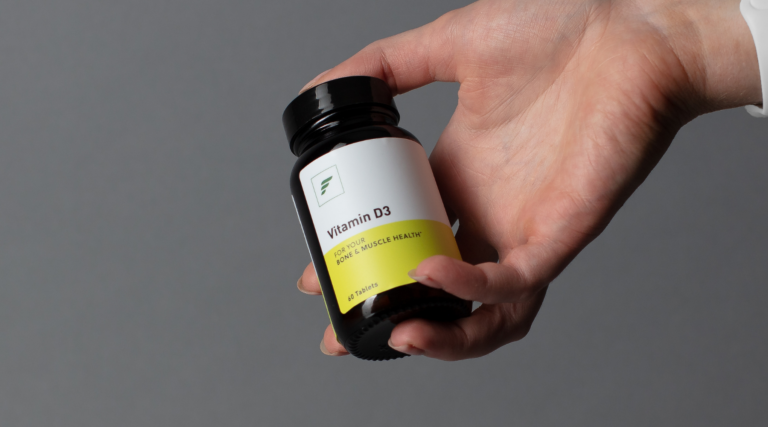Why do we need vitamin D?
Vitamin D, otherwise known as ‘the sunshine vitamin’ is synthesised by the body following sunlight exposure.
Vitamin D is a fat-soluble vitamin. It promotes the absorption of calcium and phosphorus from our diets, making it essential for maintaining bone and muscle health (1, 2). Vitamin D also contributes to the normal functioning of the immune system and our inflammatory response mechanisms (3).
What are the risks of vitamin D deficiency?
Common manifestations of vitamin D deficiency are feeling fatigued, aching or discomfort of bones, muscle cramping and a low mood.
A prolonged vitamin D deficiency can cause bone conditions like osteoporosis (brittle bones), osteomalacia (softening of the bones), osteopenia (weaker bone tissue), rickets (bone tissue that doesn’t harden in children) and muscle weakness. This can cause skeletal deformities and an increased risk of falls and fractures(1).
How to optimise your vitamin D levels
1.Spend time outside
Sunlight is the primary mechanism by which humans create Vitamin D. Simply spend around 15 minutes outside in the middle of the day with some skin exposure when the sun is out. However, relying on sunlight during the winter months may not be enough to meet your needs.
2.Eat vitamin D rich food
Vitamin D is very limited in food products but it can be found in a small amounts in:
- Fatty fish (like trout, salmon, tuna, and mackerel)
- Egg yolks
- Beef liver
- Cheese
- Mushrooms
- Fortified products like milk, plant-based milks, breakfast cereals and some brands of orange juice
It cannot be obtained from plant-based food sources, although it is available from fortified foods.
3.Take a supplement
For most of us, taking a vitamin D supplement may be the best way to ensure adequate intake, especially during the winter months. The few food sources, lack of plant-based sources, plus the unreliable sunlight we often see (or don’t see) in the UK, the NHS guidelines recommend that everyone living in the UK should take a vitamin D supplement during the winter months, from October – March (4,5)
In fact, data from a PHE National Diet and Nutrition Survey shows that 23% have low levels of vitamin D, and are at risk for developing a deficiency. Many of us aren’t getting enough vitamin D from diet and sunlight alone, and for this reason, a supplement can be recommended.
Those with a darker skin pigment or people whose skin has little or no exposure to the sun should consider taking a supplement all year round. People over 60 years old should also consider taking a supplement, as the cells in your skin make less vitamin D from sunlight as you get older (2, 3).
We would recommend supplementing vitamin D in the form of vitamin D3 which is more readily absorbed by the body compared to vitamin D2. When choosing a supplement, we would advise a supplement that provides you with minimum 1000 IU up to 2000 IU (between 25 mcg – 50 mcg).
Our FFF vitamin D3 is derived from lichen, a symbiosis between fungi and algae, which makes it an animal-free, sustainable and eco-friendly source.
What is the Nutrient Reference Value of vitamin D?
- EU NRV 5mcg/day or 100 IU
- UK NRV 10 mcg/day or 400 IU (4,5)

